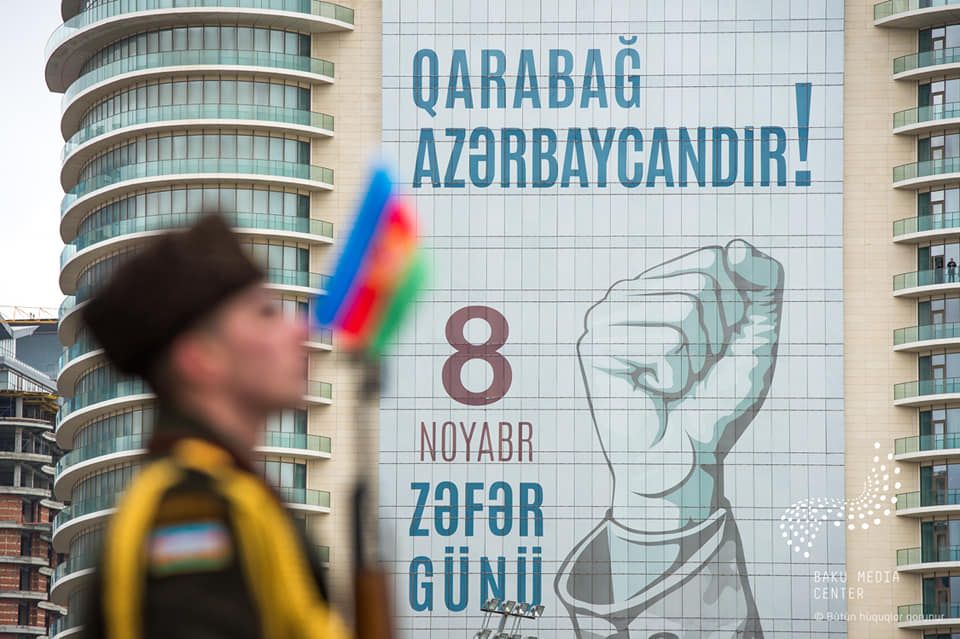4 Years since 44 Days: Reflecting on Patriotic War’s Legacy

Today, November 8, is a date of unique significance in the calendar for the people of Azerbaijan. The Garabagh issue, which had been remembered for many years in both good and bad times, was a matter that all Azerbaijanis around the world united to raise their voices for justice. The occupation policies carried out by the Armenian administration, with the support of various countries, on Azerbaijani lands for more than 30 years, came to a dead end after the counteroffensive operations launched by the Azerbaijani army in September 2020.
Up until that time, the Armenian provocations on the border, the genocides committed in Garabagh, and Armenia's ethnic cleansing policies on Azerbaijan's occupied lands had been repeatedly reported by Azerbaijan to international organizations and courts. However, countries like France, which sought to extend their influence in the South Caucasus, continued to fuel the conflict and pour oil on the fire, supporting Armenia.
The four resolutions of the UN and numerous other international documents confirmed that Armenian forces, initially deployed as part of Russia's occupation policies and later settled with Western support, had subjected the Azerbaijani population in those areas to inhumane torture while portraying themselves as victims.
How were the Armenians settled in Azerbaijani lands?
In the 18th and 19th centuries, Azerbaijani lands, with their rich culture and history, became prime targets for the Russian Empire in the north and the Persian state in the south. As trade routes passing through Azerbaijan drew the attention of Iran, the oil fields of Baku appeared indispensable to Tsarist Russia. The clash of interests between these two powers over Azerbaijan led to decades of war and the division of the land. The 1828 Treaty of Turkmenchay marked one of the greatest misfortunes in the history of the Azerbaijani people. Azerbaijan was divided along the Aras River, and Russia and Iran started implementing their oppressive policies in the region.
In the northern part, where Baku is located, Russia began efforts to strip the Azerbaijanis of their national identity and eventually their land. Armenians, mainly brought from India, were settled in the beautiful regions of Azerbaijan, including Nakhchivan, Yerevan, and Garabagh. Russia offered them special privileges and forcibly displaced the indigenous Azerbaijani population.
A historical review shows that no scholar or researcher has confirmed the historical presence of Armenians in these lands. Armenians, who began to rule over Azerbaijani lands, eventually created a puppet state with the help of Tsarist Russia, and they chose the historical center of the Erivan Khanate as their capital. This disrupted the land connection between Azerbaijan and Nakhchivan, and the Armenians even began to claim Nakhchivan for themselves. After the collapse of Tsarist Russia and the rise of Soviet rule, Armenia was recognized as an independent state and began making decisions about Azerbaijani territories, which it later claimed as its own.
During the period leading up to the collapse of the Soviet Union, lawlessness and atrocities reached their peak. In the 1980s, Armenians began to covet Garabagh and frequently attacked villages, committing massacres. Armed with Russian weapons and special protection, the Armenians faced the helpless Azerbaijani population. Despite Azerbaijan's repeated attempts to defend Garabagh from Armenian occupation, in the 1990s, another blow was dealt to the Azerbaijani people. In the aftermath of the massacres in Garabagh, 7 regions, including the jewel of Karabakh, Shusha, fell into Armenian hands. Those who witnessed these atrocities lived for many years without seeing any hope, while some never woke up.
Thousands of Azerbaijanis went missing, and many saw their loved ones suffer during the Khojaly, Meshali, and Kelbajar tragedies, but their voices for justice went unheard.
However, 30 years later, the suppressed voices of justice in Garabagh would be heard again.
The Turning Point of 2020
The Armenian occupation continued to unsettle Azerbaijan for years. From time to time, the Azerbaijani army's positions were shelled from various directions along the former border, causing civilian casualties.
Following the ceasefire agreement signed between Armenia and Azerbaijan in 1994, provocations continued, reaching a peak in April 2016 with the four-day war, known as the April battles, which ended in victory for Azerbaijan. After the battle, strategic heights in the Tartar region, including the Talish village, and other areas like Jabrayil's Lala Tepe, and Goranboy's Gulustan village were liberated from Armenian occupation.
In 2017, after realizing its weakness in the face of the Azerbaijani army, the Armenian military forces launched artillery attacks on the Fuzuli region, killing two Azerbaijani civilians, including a 2-year-old child named Zahra. This marked another attempt at provocation, but the Azerbaijani side responded decisively.
The provocations continued for three more years, and in February 2020, Azerbaijani President Ilham Aliyev and Armenian Prime Minister Nikol Pashinyan held discussions at the Munich Security Conference. President Aliyev once again presented Azerbaijan’s just position on the conflict and decisively refuted Armenia’s baseless claims based on historical facts and international law.
In March 2020, Armenia's organization of so-called “elections” in the occupied territories was condemned by the international community. The “elections” were not recognized by any international body or state.
In July 2020, Armenia launched another military provocation along Azerbaijan’s Tovuz border, resulting in the deaths of Azerbaijani military personnel. The Azerbaijani army responded fiercely, and Armenia shamelessly appealed to the Collective Security Treaty Organization (CSTO) for military support. Unfortunately, no practical steps were taken by the international community to stop Armenia's escalating provocations.
Encouraged by the lack of a global response, Armenia launched a large-scale attack on Azerbaijan on September 27, 2020, targeting Azerbaijani army positions and civilian settlements with heavy artillery.
After enduring decades of occupation, Azerbaijan refused to accept this humiliation any longer. Azerbaijan’s army responded with military actions that took Armenia by surprise. This time, Azerbaijan did not limit itself to defense but actively liberated its land, advancing with determination. Armenia, accustomed to receiving support from Russia, found itself isolated and weak as it faced Azerbaijan alone.
Azerbaijan’s victory revealed that Armenia’s aggression had been sustained only through external support, and the illusion of its strength was shattered.
November 8: The Day of Victory
On November 8, Azerbaijani journalists announced the liberation of Shusha with tears of joy. The streets of Azerbaijan filled with people celebrating the long-awaited return of their lands. The Azerbaijani military, cheered by the public, fought for every inch of reclaimed territory.
On November 8, President Ilham Aliyev addressed the nation and declared Shusha liberated. The news, “Dear Shusha, you are free!” reverberated across the country, and the Azerbaijani people achieved what seemed impossible. Shusha and other territories of Garabagh and Eastern Zangezur were liberated at the cost of over 2,000 Azerbaijani soldiers’ lives.
The land that had been occupied for 30 years was liberated in just 44 days, proving that the Armenian occupation was sustained only through external backing.
After 30 years of longing, the Azerbaijani soldier opened the path to Garabagh. Today, the liberated territories are rapidly developing. Visitors to Shusha and other regions still feel the presence of brave Azerbaijani soldiers, who sacrificed their lives for the freedom of the homeland. The spirit of the martyrs illuminates the path of those who visit.
Here we are to serve you with news right now. It does not cost much, but worth your attention.
Choose to support open, independent, quality journalism and subscribe on a monthly basis.
By subscribing to our online newspaper, you can have full digital access to all news, analysis, and much more.
You can also follow AzerNEWS on Twitter @AzerNewsAz or Facebook @AzerNewsNewspaper
Thank you!

